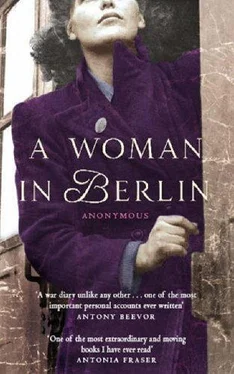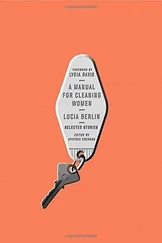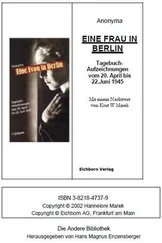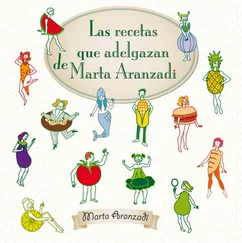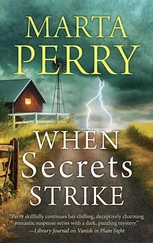I flirt with fluttering hands, hardly able to speak because my heart is pounding so. I look the man in his black eyes, amazed at his yellow, jaundiced eyeballs. We’re outside in the hall, it’s nearly dark, I prance backwards ahead of him, he doesn’t know his way in this labyrinth, he follows. I whisper: ‘Over there. Very beautiful there. No people.’ Three more paces, then two stairs… and we’re back out on the street, in the bright afternoon sun.
Right away I run to my two horse handlers, who are now combing their steeds. I point at my pursuer: ‘He’s a bad egg, that one, ha-ha!’ The man looks daggers at me and takes off. The horse grooms laugh. I talk with them a while and catch my breath. Little by little my hands calm down.
As I was chatting away, a number of heroes visited our basement, but they were more interested in watches than in women. Later I would see many an Ivan with whole collections on both arms – five or six pieces, which they would constantly compare, winding and resetting, with childlike, thief-like joy.
Our street corner has become an army camp. The supply train is billeted in the shops and garages. The horses munch their oats and hay, it’s comical to watch them stick their heads out of the broken display windows. There’s a hint of relief in the air – Oh well, there go the watches. ‘Voyna kaput,’ as the Russians say. The war is kaput. And for us it is kaput, finished, all over. The storm has rushed past and now we’re safely in its wake.
Or so we thought.
Things started happening around 6 p.m. A man built like a bull, dead drunk, came in the basement, waving his pistol around and making for the distiller’s wife. No one else would do. He chased her with his pistol up and down the basement, shoved her ahead of him, towards the door. She fought back, hitting him, howling, when all of a sudden the pistol went off. The bullet went right through the supports and hit the wall; no one was hurt. The basement broke into a panic, everyone jumped up and started screaming. The hero seemed to have frightened himself and slipped off into the corridors.
Around 7 p.m. I was sitting upstairs with the widow, peacefully eating our evening porridge, when the concierge’s youngest daughter burst in yelling: ‘Come quick, you have to talk to them in Russian. There’s more of them after Frau B.’ The distiller’s wife again. She’s by far the plumpest woman in our group, very buxom. People say they like that. Fat means beautiful, the more woman there is, the more her body differs from that of a man. Primitive people are said to have had particular respect for women who are fat, as symbols of abundance and fertility. Well, these days they’d have a hard time fording such symbols here. The older women in particular who had once been quite plump have shrunken terribly, at least for the most part. Of course, the distiller’s wife is an exception. Since the war began she hasn’t lacked for things to trade. And now she’s paying for her unmerited fat.
When I came down she was standing in the doorway, whimpering and shaking. She had managed to run out and escape. But she didn’t dare go back to the basement, nor did she dare go up the four flights of stairs to her apartment, since the German artillery was still firing occasional shells. She was also afraid the Russians might follow her upstairs. Digging into my arm so firmly that her nails left marks, she begged me to go with her to the ‘commandant’ to request an escort, some kind of protection. I couldn’t imagine what she was thinking of.
A man came by with stars on his epaulettes and I tried to explain to him how afraid the woman was, but couldn’t think of the word for ‘afraid’. He just shrugged us off impatiently. ‘Don’t worry, nobody’s going to do anything to you, go on home.’ Finally the distiller’s wife staggered upstairs, sobbing. I haven’t seen her since; she must have sneaked off somewhere. And a good thing, too – she was too compelling a decoy.
No sooner was I back upstairs than the concierge’s girl – evidently the designated messenger – came running in for the second time. More men in the basement. Now they’re after the baker’s wife, who’s also managed to keep a bit of flesh on during the years of war.
The baker comes stumbling towards me down the hall, white as his flour, holding out his hands: ‘They have my wife…’ His voice breaks. For a second I feel I’m acting in a play. A middle-class baker can’t possibly move like that, can’t speak with such emotion, put so much feeling into his voice, bare his soul that way, his heart so torn. I’ve never seen anyone but great actors do that.
In the basement. The lantern is no longer burning; it’s probably out of kerosene. By the flickering light of a so-called Hindenburg lamp – a wick in tallow kept in cardboard – I see the baker’s wife in a recliner, her ashen face, her twitching mouth. Three Russians are standing next to her. One is jerking her up by the arm, but when she tries to getup, another shoves her back in the chair as if she were a puppet, a thing.
All three are talking to one another very quickly, evidently arguing. I can’t understand much; they’re speaking in slang. What to do? ‘Commissar,’ the baker stammers. Meaning, find someone who has some authority. I go out on the street, now peaceful, calmed down for the evening. The shooting and burning are far away. As luck would have it I run into the same officer who had been so dismissive with the distiller’s wife. I speak to him in my most polite Russian, ask him for help. He understands what I’m saying and makes a sour face. Finally he follows me, reluctant and unwilling.
The people in the basement are still scared stiff and silent, as if they all, men, women and children, had turned to stone. It turns out that one of the three Russians has backed off. The other two are still standing next to the baker’s wife, arguing. The officer joins the conversation, not with a tone of command but as among equals. Several times I hear the expression ‘ukaz Stalina’ – Stalin’s decree. Apparently Stalin has declared that ‘this kind of thing’ is not to happen. But it happens anyway, the officer gives me to understand, shrugging his shoulders. One of the two men being reprimanded voices his objection, his face twisted in anger: ‘What do you mean? What did the Germans do to our women?’ He is screaming: ‘They took my sister and…’ and so on. I can’t understand all the words, only the sense.
Once again the officer speaks, calming the man down, slowly moving towards the door, and finally managing to get both men outside. The baker’s wife asks, hoarsely, Are they gone?’
I nod, but just to make sure I step out into the dark corridor. Then they have me. Both men were lying in wait.
I scream and scream… I hear the basement door shutting with a dull thud behind me.
One of them grabs my wrists and jerks me along the corridor. Then the other is pulling as well, his hand on my throat so I can no longer scream. I no longer want to scream, for fear of being strangled. They’re both tearing away at me, instantly I’m on the floor. Something comes clinking out of my jacket pocket, must be my key ring, with the key to the building. I end up with my head on the bottom step of the basement stairs. I can feel the damp coolness of the floor tiles. The door above is ajar, and lets in a little light. One man stands there keeping watch, while the other tears my underclothes, forcing his way—
I grope around the floor with my left hand, until I find my key ring. I hold it tight. I use my right hand to defend myself. It’s no use. He’s simply torn off my suspender belt, ripping it in two. When I struggle to come up, the second one throws himself on me as well, forcing me back on the ground with his fists and knees. Now the other keeps lookout, whispering: ‘Hurry up, hurry up.’
Читать дальше
